ANSC 331 Exam 2
1/189
There's no tags or description
Looks like no tags are added yet.
Name | Mastery | Learn | Test | Matching | Spaced |
|---|
No study sessions yet.
190 Terms
Define the Estrous cycle?
a series of predictable reproductive events beginning at the onset of one estrus and ending at the onset of the next estrus
What system regulates the estrous cycle?
The Hypothalamic Pituitary Gonadal (HPG) axis
Describe how the HPG axis regulates Estrous?
Hypothalamus releases GnRH to anterior pituitary
Anterior pituitary releases FSH/LH to ovaries
Ovaries release estradiol and/or progesterone
Where is estradiol produced specifically? What type of hormone is it? What are 3 results of its secretion?
produced by the antral follicles
type: steroid hormone
results of secretion:
estrus behavior
high concentration will signal to hypothalamus for GnRH release and ovulation
mucus secretions in cervix for sperm transport
Where is progesterone produced specifically? What type of hormone is it? What are 3 results of its secretion?
produced by corpus luteum
type: steroid hormone
results:
maintains pregnancy
suppresses uterine tone and hypothalamus GnRH release (so decreased FSH release)
thickens mucus of cervix
Where is FSH produced specifically? What type of hormone is it? What is a result of its secretion?
produced by the anterior pituitary
type: glycoprotein
result: promotes follicle growth
Where is LH produced specifically? What type of hormone is it? What is a result of its secretion?
produced in anterior pituitary
type: glycoprotein
result: causes ovulation and luteinization
Where is GnRH produced specifically? What type of hormone is it? What is a result of its secretion?
produced by hypothalamus
type: peptide hormone
result: causes pituitary release of FSH/LH
Where is PGF2a produced specifically? What type of hormone is it? What is a result of its secretion?
produced by uterus (livestock)
type: lipid
result: causes luteolysis
What’s the difference between polyestrus, seasonal polyestrus, and monoestrus? How many times a year can the animal get pregnant? Example species?
polyestrus: uniform and regular cycles throughout the year
animal can get pregnant year-round
ex: cattle, swine, rodents, domestic cats
seasonally polyestrus: clusters of cycles only during certain seasons of the year
animal can only get pregnant during a specific season
ex: elk, deer, ewe, ranny, horses, wild cats
monestrus: one cycle per year
ex: bear, fox, wolf, dog
What’s the benefit to being seasonally polyestrus?
offspring can be born at a time where more nutrients (e.g. grass) is available to feed and grow young
When do short-day breeders start to have estradiol spikes (aka breeding time)? Example species?
when the days are getting shorter (Sept-Nov)
ex: ewe, doe, elk, ranny
When do long-day breeders start to have estradiol spikes (aka breeding time)? Example species?
when the days are getting longer (Apr-Jun)
ex: horses, wild cats
Why do monoestrus species have a longer duration of estrus?
important to breed at the only time when the animal is sexually receptive so more time to achieve the goal of pregnancy
What’s the difference between the follicular phase and luteal phase of the Estrous cycle? When does each begin and end? What is the major hormone involved?
Follicular Phase:
begins after regression of corpus luteum
ends with ovulation
major hormone: estrogen
Luteal Phase:
begins at ovulation
ends at luteal regression
major hormone: progesterone
Which phase of the Estrous Cycle, follicular or luteal, is an animal in most of the time?
luteal (80%)
What stages are within the follicular phase?
Follicular Phase: proestrus and estrus stages
What stages are within the luteal phase?
metestrus and diestrus stages
What is proestrus defined as? What hormones are increasing/decreasing? Which follicle is becoming more prominent at this time?
the final growth ovulatory follicles (s) + estradiol secretion
period transitioning from progesterone dominance to estrogen dominance
preovulatory follicle enlarges in prep for ovulation and secretes estrogen
What is estrus characterized by? What hormones are present at high levels/surging? What makes the female become receptive?
period for sexual receptivity + peak estradiol secretion
estrogen at highest level, drives behavioral estrus
increase in cervical mucus and uterine motility for optimal sperm transport
LH surge
How long after the LH surge does ovulation occur?
24-48 hours
What is metestrus characterized by? What hormones are rising and falling? What structure forms?
characterized by partial corpus luteum formation (between ovulation and full corpus luteum function)
transition from estradiol dominance to progesterone dominance
luteinization
What is diestrus characterized by? What hormones are most present?
characterized by sustained luteal secretion of progesterone
corpus luteum fully functional
high progesterone prepares uterus for pregnancy
What is the longest stage in the estrous cycle?
diestrus
What 2 things happen in the uterus during diestrus?
uterine fluid secretions increase
uterine contractions stop
If an animal is not pregnant in diestrus, the ___ ___ will regress.
corpus luteum
Know chart on slide 19.
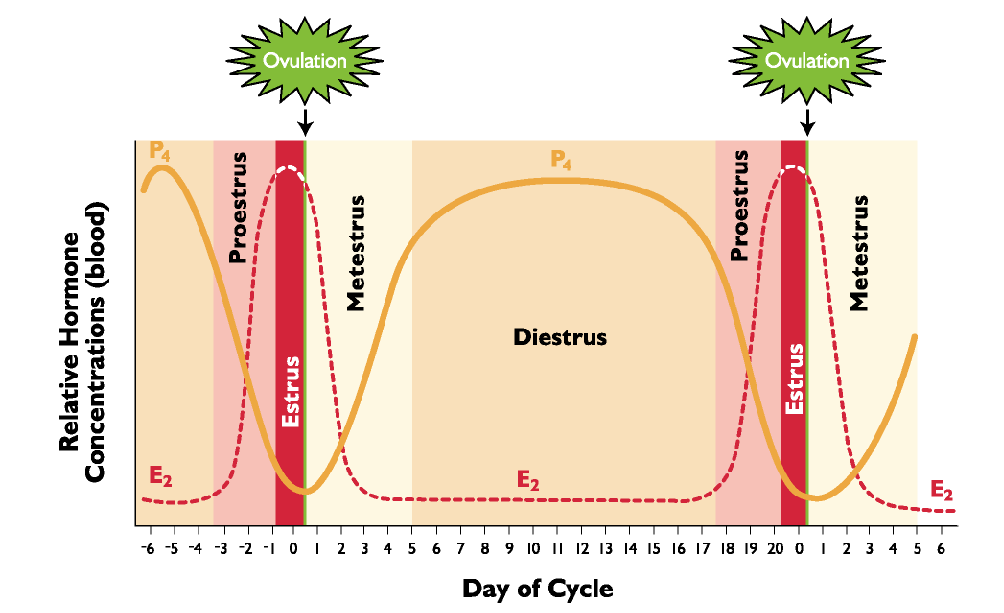
What are the lengths of estrus for the following species?
a. cow
b. ewe
c. sow
d. mare
a. cow: 15hrs
b. ewe: 30hrs
c. sow: 50hrs
d. mare: 7 days
What’s maternal recognition of pregnancy?
if pregnant, CL stays formed but if not pregnant, CL regresses so that female can get pregnant again
How many cycles does a bitch go through each year?
1-2 a year
What are the 4 stages of the Estrous cycle of the bitch?
anestrus
proestrus
estrus
diestrus
What is anestrus characterized by?
period of reproductive quiescence
Describe proestrus in a bitch. Is there any discharge? When does the cycle end?
beginning of the cycle
blood-tinged vaginal discharge
ends with sexual receptivity of the female
In the bitch, what occurs during estrus? What hormones are present and what are their trends? What is unique about ovulation and fertilization during estrus?
both FSH and LH peak in early estrus
progesterone gradually increases until the end of estrus when it peaks
progesterone increases during the latter part of estrus signifying luteinization
In estrus in a bitch, ovulation occurs at about the ___ day. Fertilization is completed at about the ___ day.
third, sixth
Define superfecundation.
long interval between ovulation and fertilization allows for superfecundation to occur in dogs
female can breed with multiple males and create litters with different breeds
What occurs during diestrus in a bitch? Does a bitch have to be pregnant to enter this phase? What hormones are peaking?
both pregnant and open bitches can enter diestrus
progesterone peaks at 15 days (1/4 in stage), then decreases gradually
Summary slide for estrous in the bitch.
Anestrus:
FSH is ___ (increasing/decreasing/constant).
Estrogen is ____ (increasing/decreasing/constant).
Proestrus:
FSH is ___ (increasing/decreasing/constant) and the beginning and middle of stage and ___ (increasing/decreasing/constant) towards the end of the stage.
Estrogen is ____ (increasing/decreasing/constant) towards the end of the stage.
LH is ___ (increasing/decreasing/constant) towards the end of the stage.
Estrus:
FSH is ___ (increasing/decreasing/constant) and the beginning and middle of stage and __ (peaks, stops) when ovulation is complete.
Estrogen is ___ (increasing/decreasing/constant) towards the end of the stage.
LH is ___ (increasing/decreasing/constant).
Progesterone is ___ (increasing/decreasing/constant) towards the end of this stage.
Diestrus:
Progesterone is ___ (increasing/decreasing/constant) in the beginning and ___ (increasing/decreasing/constant) towards the end of this stage.
Anestrus:
FSH is constant.
Estrogen is increasing (barely).
Proestrus:
FSH is constant at the beginning and middle of stage and increasing (peaking) towards the end of the stage.
Estrogen is increasing towards the end of the stage.
LH is (increasing (peaking) towards the end of the stage.
Estrus:
FSH is decreasing at the beginning and middle of stage and stops when ovulation is complete.
Estrogen is decreasing towards the end of the stage.
LH is decreasing (peaks at end of proestrus).
Progesterone is increasing towards the end of this stage.
Diestrus:
Progesterone is increasing (and peaking at ¼ in stage) in the beginning and decreasing towards the end of this stage.
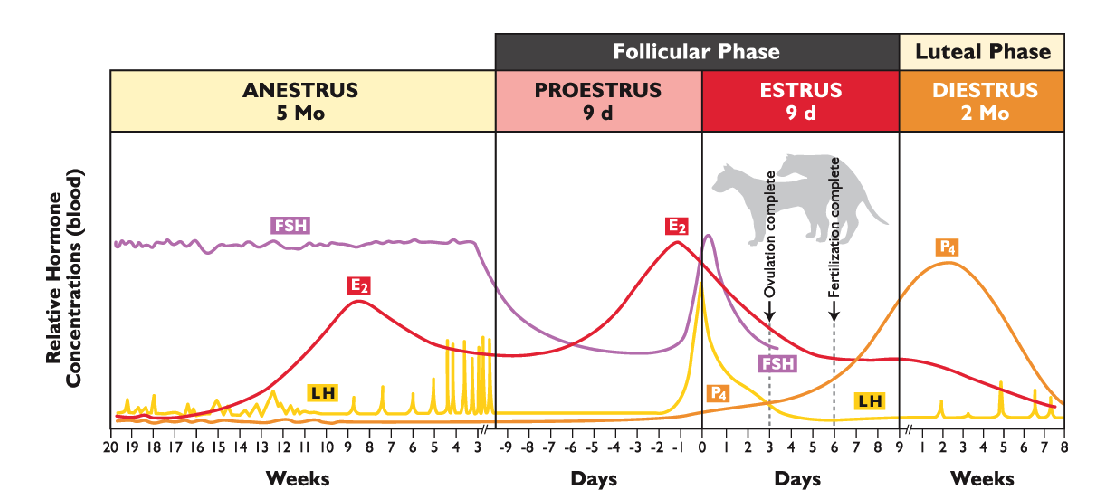
True/False. A queen can ovulate without copulation.
False. Queen’s are induced ovulators (need mating to induce ovulation…CL formation….progesterone increase
What are the 3 stages of Estrous in a queen that does NOT mate?
no mating: Proestrus, estrus, postestrus→ interestrus period that follows estrus in a queen that has not been induced to ovulate by copulation
What species is the Estrous cycle of a rodent most similar to? Why?
cats: characteristics of the cycle depend on whether or not the rodent mates (will not ovulate unless bred)
What is the formation of a fully functional CL most dependent on in a rodent?
depends on prolactin release from pituitary during mating
prolactin release is key in the formation of a fully functional CL
In each of the following groups of animals, is ovulation and CL formation spontaneous or induced?
a. cow, ewe, sow, mare
b. rats, mice, hamsters
c. rabbit, cat, mink, ferret, otter, alpaca
a. cow, ewe, sow, mare: spontaneous
b. rats, mice, hamsters: spontaneous
c. rabbit, cat, mink, ferret, otter, alpaca: induced
In each of the following groups of animals, is CL function spontaneous, induced by prolactin, or induced by stimulation?
a. cow, ewe, sow, mare
b. rats, mice, hamsters
c. rabbit, cat, mink, ferret, otter, alpaca
a. cow, ewe, sow, mare: spontaneous
b. rats, mice, hamsters: induced (prolactin)
c. rabbit, cat, mink, ferret, otter, alpaca: induced (stimulation)
What is anestrus? What are the 6 characteristics that cause it?
period without regular estrous cycles (temporary)
pregnancy
lactation
presence of offspring
season
stress (think malnutrition)
pathology
What is seasonal anestrus characterized by? What drives it?
estrus during specific seasons
photoperiod driven
When is anestrus in long-day breeder? What about short-day breeders? Why is this important?
long-day: anestrus is in fall/winter
short-day: anestrus is in spring/summer
important because this prevents females from conceiving during periods of the year when survival of the embryo or neonate would be low
If long-day breeders are in anestrus in fall/winter, when do they give birth? What about short-day breeders who are in anestrus in spring/summer?
long-day breeders: give birth in the following spring (11 mo pregnancy)
short-day breeders: give birth in spring
Describe the pathway that seasonal breeders use to regulate their reproductive cycles. Key terms: kisspeptin, GnRH, retinal nerves, melatonin, FSH/LH, pineal gland
retinal nerves are excited by light
neurons synapse in the hypothalamus
signals to the pineal gland to regulate melatonin release (think: melatonin released more during short days because less light)
acts on kisspeptin neurons to regulate GnRH in hypothalamus
regulates FSH/LH in ant. pituitary
regulates cyclicity
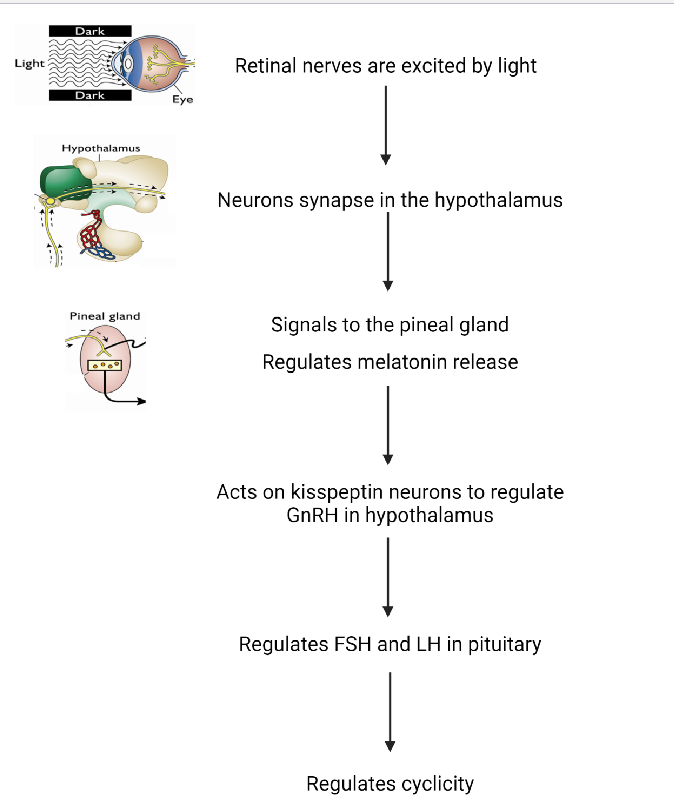
In long-day breeders, what occurs when melatonin goes down? (key terms: cyclicity, kisspeptin, GnRH)
kisspeptin neurons go up
GnRH increases
cyclicity occurs
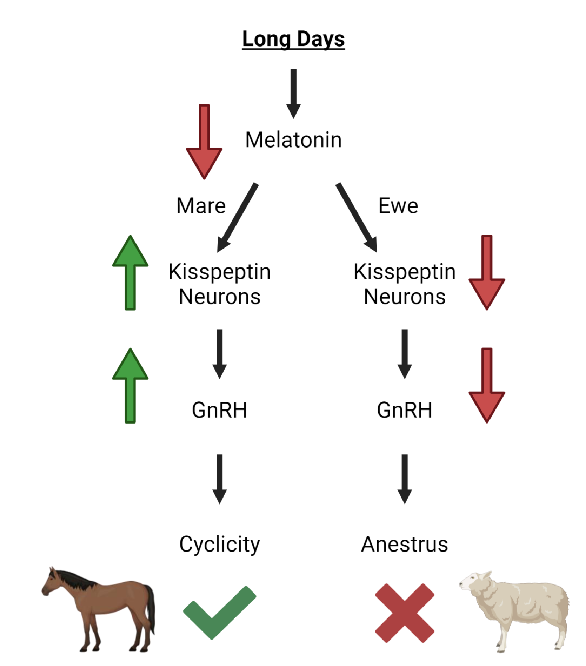
In short-day breeders, what occurs when melatonin goes up?
kisspeptin neurons go up
GnRH goes up
cyclicity occurs
What causes lactational anestrus? Is there species variation?
caused by postparturition and lactation period (do not have regular estrous cycles while lactating)
significant species variation
Which 2 species lack lactational anestrus? Which 2 have lactational anestrus?
Lack: mare, dog
Have: beef and sow
What factor determines how long lactational anestrus is?
how long offspring are suckling for
What’s nutritional anestrus? Describe the process that causes this. (hormones, anatomical parts)
low energy/protein intake can result in anestrus because not enough nutrition to support pregnancy/another cycle
GnRH secretion decreases
LH/FSH decreases
creates inactive ovaries
Define silent ovulation.
an oocyte is ovulated, but it doesn’t stimulate any behavioral estrus because the brain hasn’t been in the presence of estradiol in a while
How does behavioral estrus occur after a silent ovulation?
the CL formed from the oocyte produced from the silent ovulation releases progesterone that primes the brain for steroid hormone reactions
What’s the difference between the Estrous cycle and Menstrual cycle? How are the follicular and luteal phases divided up? What does each cycle begin with?
Estrous:
follicular phase = short, luteal phase = long
cycle begins with estrus
Menstrual:
follicular and luteal phase evenly split
cycle begins with menses (sloughing of endometrium)
What is the Menstrual cycle defined as?
the period between 2 successive menstrual periods
Ovulation occurs in the ___ of the Menstrual cycle.
middle (day 14)
What are 3 stages of the follicular phase in the Menstrual cycle? What hormones are most prominent in each?
menses
proliferative phase: estrogen increasing
ovulation: estrogen peaks, LH peaks
What’s the trend of endometrial thickness as the menstrual cycle continues?
In proliferative phase (follicular), thickness low, but increasing
In secretory phase (luteal), thickness high
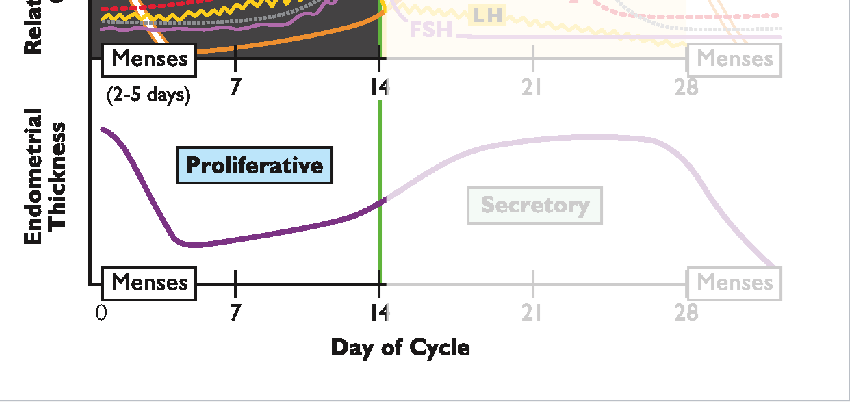
What hormone is most prevalent in the luteal phase of the menstrual cycle?
progesterone
Why is the luteal phase also dubbed the secretory phase in the uterus?
uterus increases secretory activity to prepare the uterus for pregnancy
Know this chart.
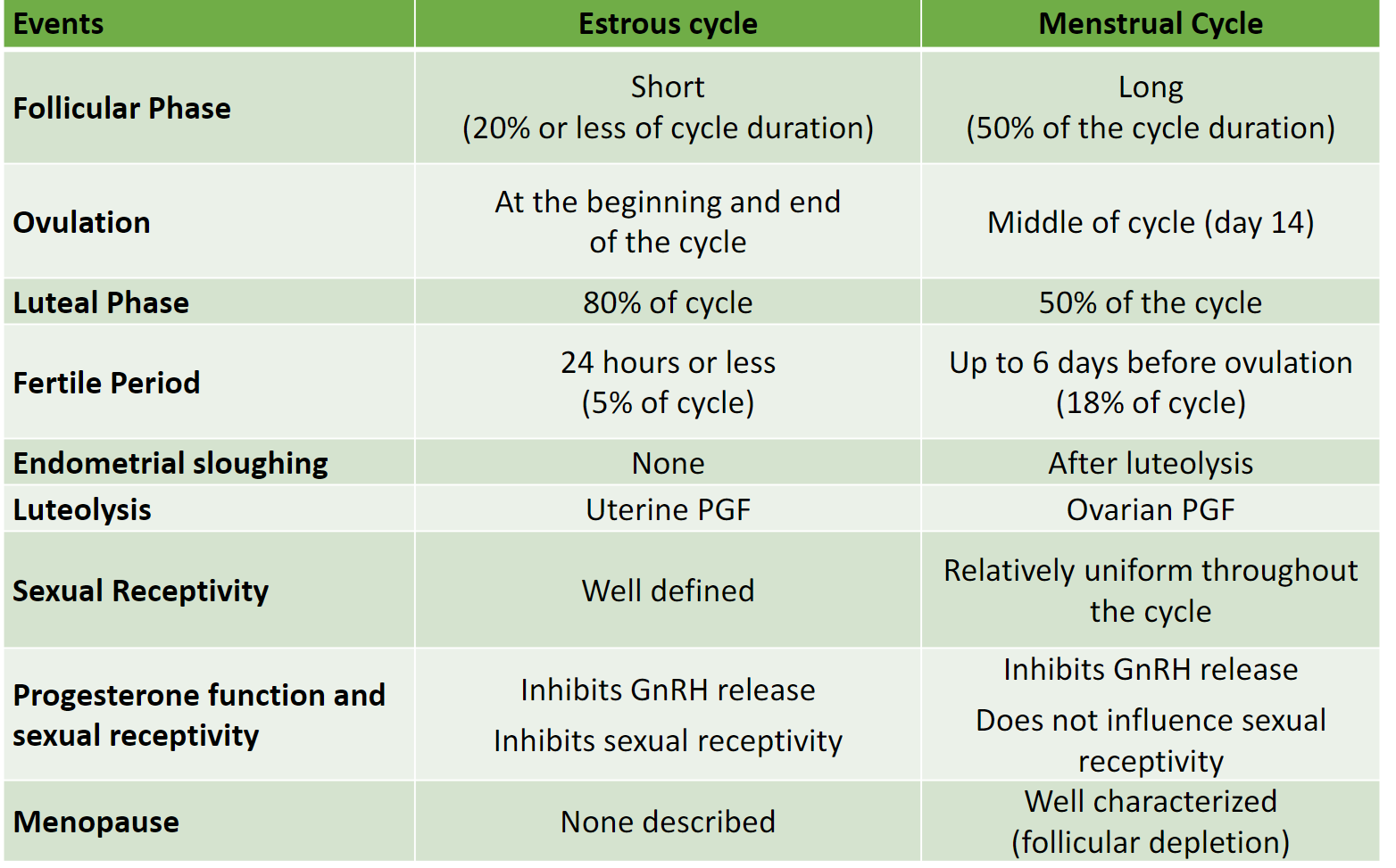
What’s amenorrhea? What are 2 causes?
the absence of menses in reproductive aged women
causes:
low nutritional intake (can include performance athletes because their bodies are in a constant state of max energy)
lactation (when nutrition is limited)
The follicular phase contains ___ and ___ while the luteal phase contains ____ and ____.
proestrus, estrus
metestrus, diestrus
What is proestrus characterized by?
the transition from high progesterone to estradiol
When does ovulation occur in the Estrous cycle?
at the end of estrus
Review estrous cycle review activity animal differences.
In the Estrous cycle, what marks the end of the follicular phase?
ovulation
The regulation of the follicular phase is regulated by what 3 anatomical parts?
hypothalamus
anterior pituitary
ovaries
What’s the difference between the surge center and tonic center? What do they secrete and how much? Are they sensitive to positive or negative feedback? What does this mean?
Surge Center
secretes high volume of GnRH in a very short amount of time
sensitive to positive feedback (estradiol increase leads to GnRH increase)
sensitive to negative feedback (progesterone limits GnRH release)
Tonic Center
secretes small amounts of GnRH at a constant rate over time (pulsatile)
sensitive to negative feedback (when progesterone increases, FSH/LH production decreases, which leads to hypothalamus to make more GnRH)
For the surge center to work properly, what are the conditions it needs to be under? (think hormones)
high estradiol low progesterone
What are the conditions of early follicular growth? What hormones are increasing/decreasing? What is GnRH doing?
progesterone declines (due to luteolysis) while secretion of FSH and LH increases
GnRH pulse frequency is increasing
What are the conditions of the mid-late follicular phase? What hormones are increasing/decreasing? What is occurring with the follicles? What is GnRH doing?
FSH and LH stimulate ovarian follicles to secrete estradiol (so estradiol increasing)
the dominant follicle will rise above the rest and the other follicles will undergo atresia
when estradiol reaches a certain threshold, positive feedback on GnRH secretion by the surge center leads to the production of a lot of GnRH
Describe the process that the HPG axis undertakes during the mid-late follicular phase to get a follicle to ovulate. (key terms: LH, FSH, estradiol, GnRH, inhibin, threshold point)
FSH and LH stimulate ovarian follicles to secrete estradiol
estradiol reaches threshold point, causes surge center to release large quantity of GnRH
Follicles secrete inhibin (which is a negative feedback system for FSH secretion so FSH secretion decreases)
estradiol suppresses FSH secretion
causes LH secretion to increase
= ovulation occurs
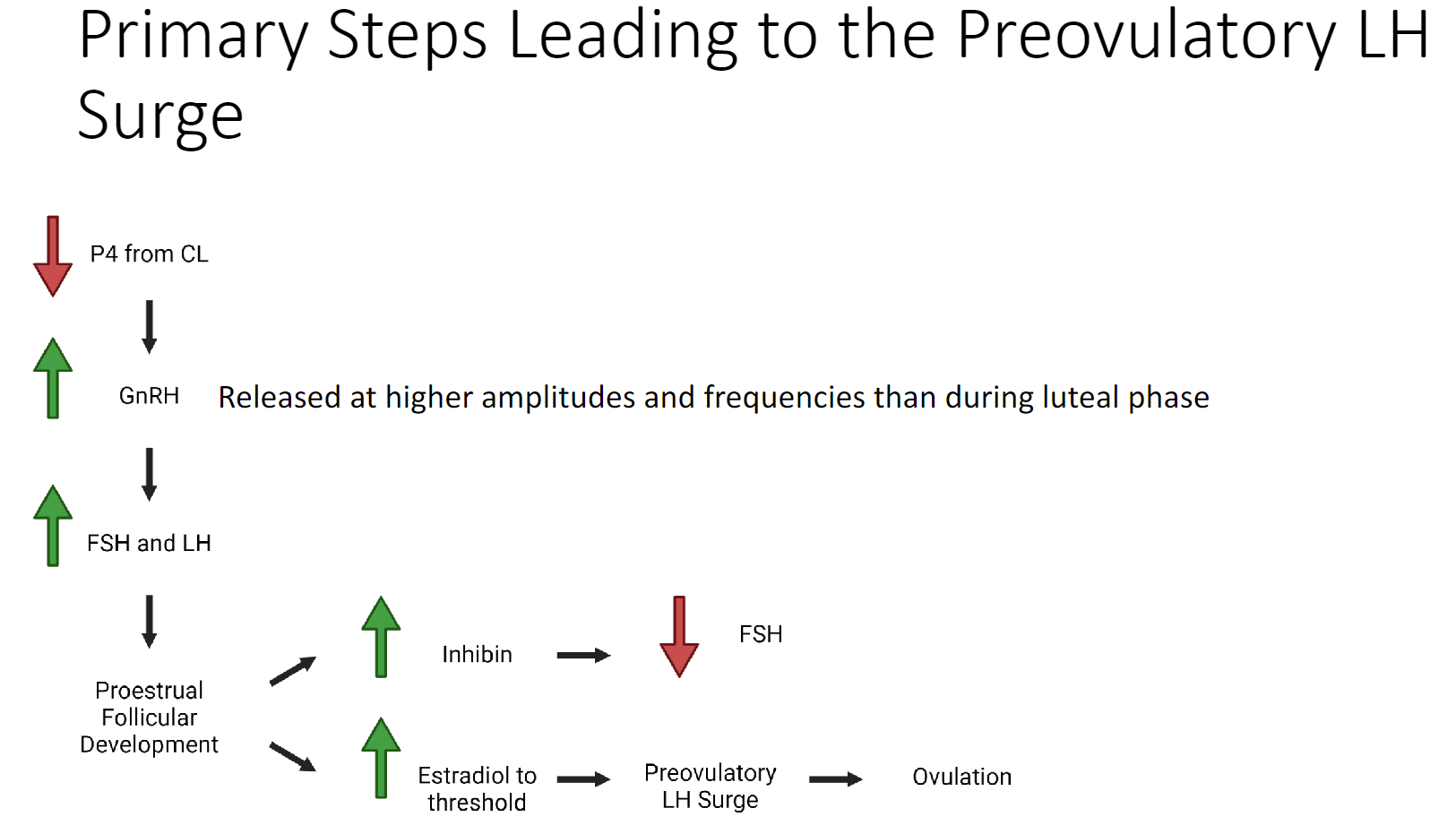
What’s the main function of inhibin? Where is it secreted? What type of hormone is it?
to decrease FSH secretion from ant. pit.
secreted by granulosa cells (glycoprotein)
As follicles grow and become larger, do they become more FSH or LH focused?
LH focused (so FSH follicles will undergo atresia due to inhibin release)
Define folliculogenesis. What is it controlled by? Is it a continuous process or does it only occur in a certain phase of Estrous?
the process of follicle growth and degeneration
controlled by FSH and LH
occurs continuously throughout estrous cycle
In folliculogenesis, is preantral growth fast or slow?
very slow process, continuous
During the activation and preantral growth period of folliculogenesis, do the follicles produce hormones? Is this stage gonadotropin independent or dependent?
follicles do not make hormones (inhibin and estrogen)
gonadotropin independent
During recruitment (emergence), what occurs? Is this stage gonadotropin independent or dependent? What hormones are secreted?
a cohort of small antral follicles begin to grow
gonadotropin dependent (FSH dependent)
follicles begin secreting low amounts of inhibin and estrogen
During selection, what occurs? What is this stage dependent on hormone wise? What hormones are increasingly secreted? What hormone is decreasing?
growing follicles from recruited group that did not undergo atresia are selected
FSH dependent/later LH dependent
secrete increasing amounts of estradiol and inhibin
FSH going down because of inhibin increase
During dominance, what occurs? What type of follicle is present? What hormones are high? What is this stage dependent on?
1 or more large preovulatory follicles is present
inhibin and estrogen are high
dependent on LH
Why is dominance an important process?
regulates number of offspring in the female
What are 2 ways atresia of other follicles occurs during dominance?
high inhibin and estrogen prevent FSH from recruiting more follicles
reduced blood supply
Folliculogenesis:
Activation and preantral growth
a. gonadotropin (independent/dependent)
Recruitment (emergence)
a. FSH is (high/low).
b. LH is (high/low).
c. Inhibin is (high/low).
d. Estrogen is (high/low).
Selection:
a. FSH is (high/low/medium).
b. LH is (high/low/medium).
c. Inhibin is (high/low).
d. Estrogen is (high/low).
Dominance
a. FSH is (high/low).
b. LH is (high/low).
c. Inhibin is (high/low).
d. Estrogen is (high/low).
Activation and preantral growth
a. gonadotropin independent
Recruitment (emergence)
a. FSH is high
b. LH is low
c. Inhibin is low
d. Estrogen is low
Selection:
a. FSH is medium
b. LH is medium
c. Inhibin is high
d. Estrogen is high
Dominance
a. FSH is low
b. LH is high
c. Inhibin is high
d. Estrogen is high
In which follicular wave, the first or second, do we get successful ovulation? Why?
second; in the first follicular wave, all follicles (even dominant follicle) undergoes atresia because progesterone too high)
dominant follicle will ovulate in 2nd follicular wave because of luteolysis (low progesterone allows growth of follicles)
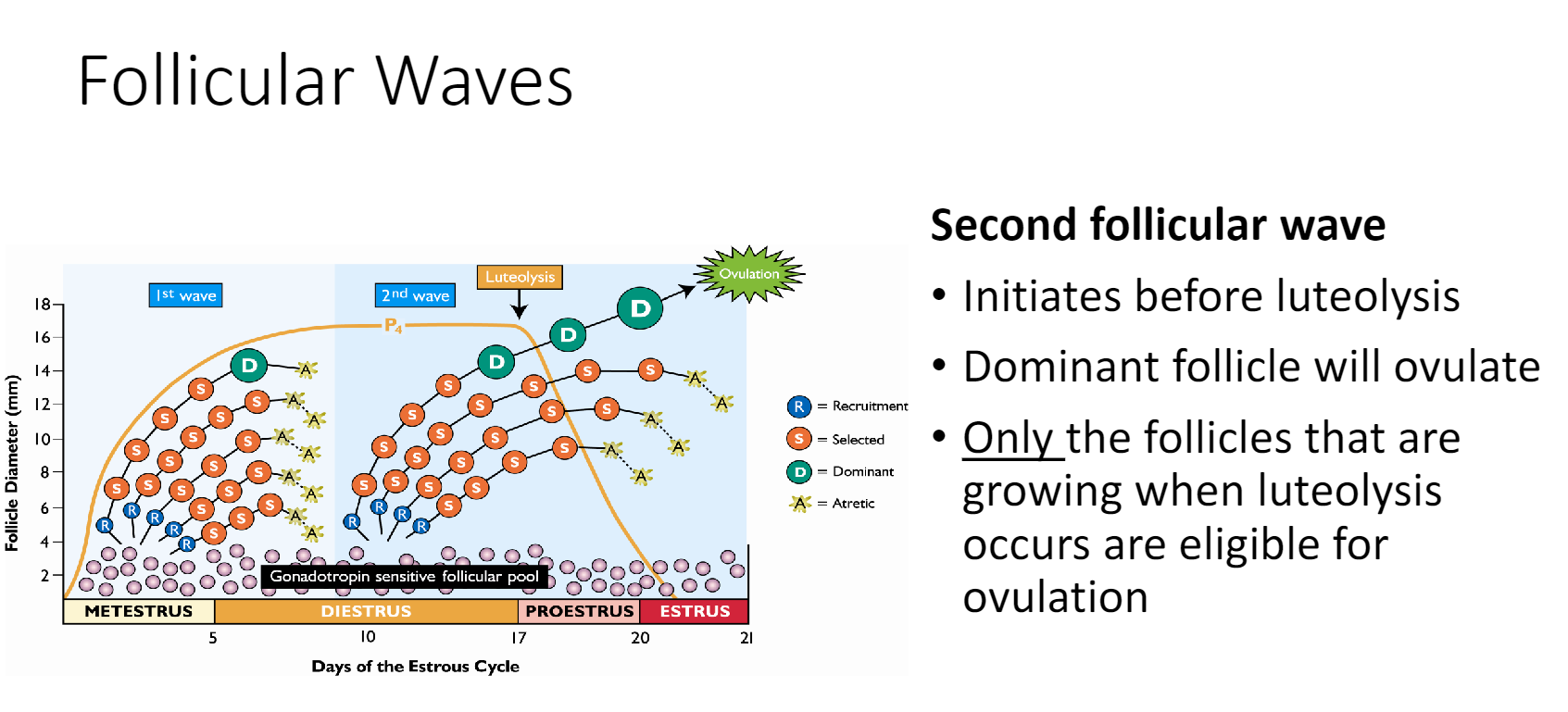
Only follicles that are growing when ___ occurs are eligible for ovulation.
luteolysis
Which steroid hormone is most like cholesterol? Least like cholesterol?
most: progesterone
least: estradiol
Can estradiol be broken down into testosterone or progesterone if needed?
no; no reverse reactions
In the 2 cell, 2 gonadotropin model, What do they theca cells have receptors for? What hormones do they produce?
theca cells:
have receptors for LH
have enzymes to convert cholesterol into pregnenolone → progesterone → testosterone
In the 2 cell, 2 gonadotropin model, What do they granulosa cells have receptors for? What hormones do they produce?
granulosa cells:
have receptors for FSH
have enzymes to convert testosterone (from theca cell production) into estradiol
A cow has a gene mutation and produces NO FSH. Will her follicles make steroid hormones? If so, which one(s)? Why?
yes, follicles will make pregnenolone→ progesterone → testosterone bc of LH but testosterone can’t be converted into estradiol because no FSH
A cow has a gene mutation and produces NO LH. Will her follicles make steroid hormones? If so, which one(s)? Why?
no, follicles will not make any steroid hormones
won’t form testosterone so by default, estradiol can’t be formed
A sheep has a rare condition in which the theca cells do not form. In this condition, the granulosa cells of the follicle form completely normally. Will her follicles make steroid hormones? If so, which one(s)? Why?
theca cells → produce LH
convert pregnenolone → progesterone → testosterone
no theca cells = no steroid hormone synthesis
**(same thing as NO LH scenario)
If you had granulosa cells that you extracted from a follicle and you wanted to use them to make estradiol (this is possible!), what would they need in order to be able to do it?
Assume they already have all the nutrients needed to keep them alive.
need to supply granulosa cells with testosterone and FSH to make estradiol
What are 6 effects of estradiol on the reproductive tract?
increased blood flow
increased leukocytosis
increased mucus production
increased tone and mobility of muscularis of reproductive tract
reproductive behavior
initiation of uterine gland growth
What’s the function of increased blood flow as a result of estradiol in female reproductive tract?
it facilitates secretion and deliverance of leukocytes